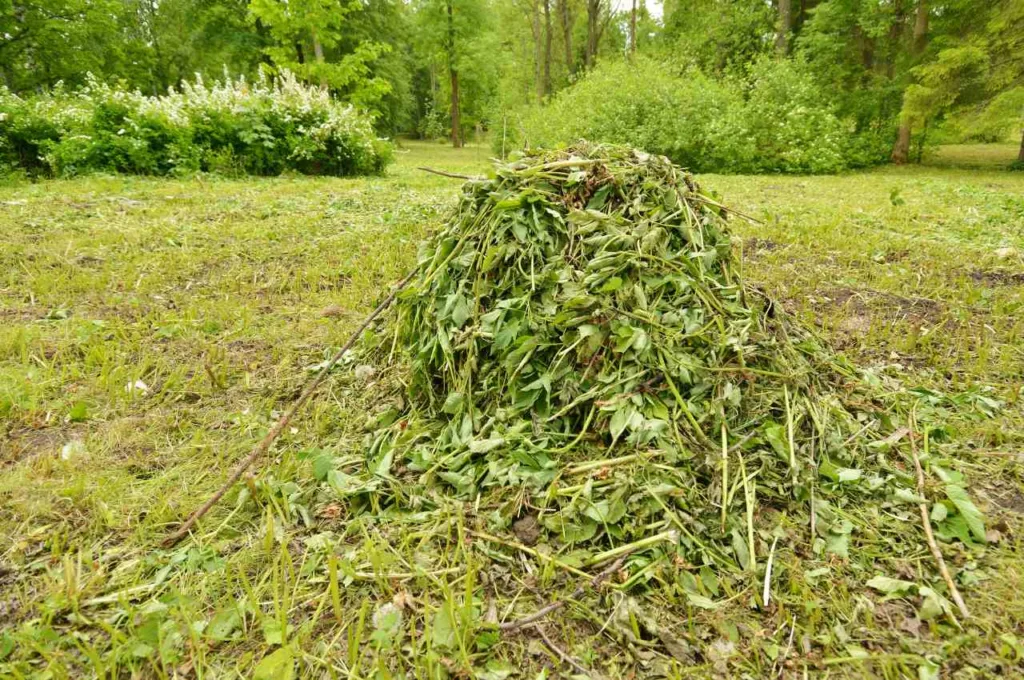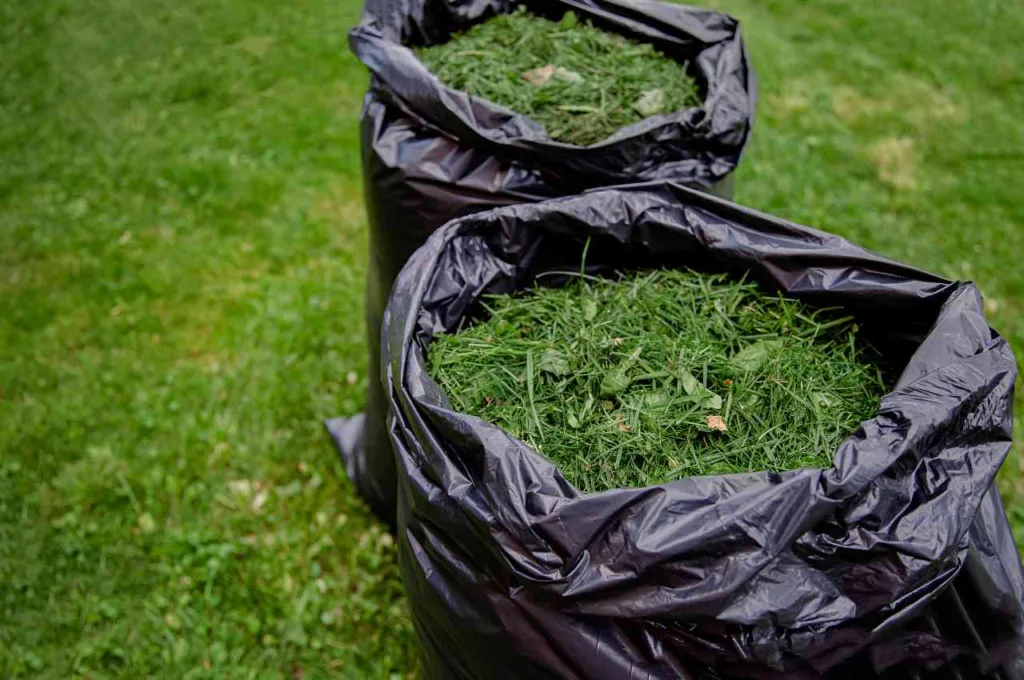You’ve probably heard that mulching mowers can help you to achieve a greener, thicker lawn.
But what if your lawn has weeds? Will mulching grass spread weeds to other parts of your garden?
We’ve answered everything you should know in this guide.
Important note: This article discusses the act of mulching grass clippings (i.e. using a mulching lawn mower that cuts grass up small and feeds them back onto your lawn). We do not discuss adding mulch (i.e. inorganic material) to your lawn, which helps soils to retain moisture in summer and has weed-suppression benefits.
✅Key Takeaways:
Mulching lawn mowers may possibly spread weeds if they’re used to mow weeds that have produced seed heads.
In most cases, using a mulching mower shouldn’t increase the risk of weed spreading, and mulching can even control weeds on your lawn.
You can prevent the likelihood of weed spreading when using a mulch mower by implementing lawn care practices to encourage healthy grass growth and spot-treat any weeds you come across.
Table of Contents
🌾 Does A Mulching Lawn Mower Spread Weeds?
Yes, using a mulching lawn mower might spread weeds on your lawn. If there are weed seeds present on your lawn or on the weeds themselves, some of these seeds may be transported to other parts of your garden when you mow, causing your weed problem to spread.
However, this problem isn’t unique to mulching mowers and can happen regardless of how you mow your lawn. When a mower blade cuts, say, a dandelion that has set seed, the action will cause some seeds to break off the plant, where they’ll be carried across your lawn and may take root. Mulching only slightly increases the likelihood of weed spreading because the mulch clippings are dispersed back onto your lawn rather than being bagged up.
If your lawn is relatively weed-free or if the weeds haven’t gone to seed, a mulching mower can actually help to control lawn weeds. The mulch (grass clippings that have been finely chopped and returned to the lawn) blocks sunlight and prevents weed seeds from reaching the soil, helping to suppress weed growth.
So, unless you have a bad weed problem that’s spiraling out of control, mulching grass clippings with a lawn mower shouldn’t significantly increase the risk of spreading weeds – and you could even argue that this method of mowing helps control weeds.
♻️ How Does A Mulching Mower Spread Weeds?
In case you need a recap, a mulching lawn mower cuts grass into tiny clippings, then disperses these clippings back onto the lawn as you mow.
A mulching mower eliminates the need to bag your lawn clippings because they’re small enough to decompose quickly.
If you have weeds on your lawn, the mower will cut up these weeds and distribute them, along with grass clippings, back onto your garden.
This may potentially introduce weeds to other parts of your lawn if any of these weeds have gone to seed, because the mower will deposit the weed seeds back onto the soil surface.
However, you could argue that there’s a general risk of weed spreading anyway (due to wind, bird activity, and so on) if the weeds in your lawn have gone to seed. So, using a mower to mulch grass clippings shouldn’t make a huge difference in the grand scheme of things.
If your weeds haven’t developed seed heads, mulch mowing won’t cause the spreading of weeds because you’ll simply be depositing weed stems and leaves onto your lawn, which can’t promote new weed growth. Most weeds need either seeds or root fragments to grow.
So, make sure to take steps to prevent spreading weed seeds on your lawn when using a mulching mower, and you shouldn’t notice any additional weed activity due to your mowing habits.

🤷♂️ Is Mulching Or Bagging Grass Better?
Mulching lawn clippings is better if you want to avoid the hassle of regularly emptying a grass box and you’re prepared to mow frequently (to prevent grass from growing too long between mows, which may result in the formation of grass clumps).
On the other end, you might need to bag your grass clippings if you don’t want to mow regularly or you can’t mulch for whatever reason (for example, if your grass is too long or you’re mowing in damp conditions).
We’ve written an entire article on grass mulching vs bagging, which we recommend reading if you want to know more about the pros and cons of each mowing method.

📉 How To Reduce Weed Spreading When Using A Mulching Mower
Nobody wants their mowing habits to contribute to the spreading of lawn weeds.
Here are a few different ways you can reduce weed spreading when mulching lawn clippings:
🍀 Control Weeds In Your Lawn
The best way to prevent the spreading of weeds by mulch mowing is to implement other methods of weed control.
Check your lawn once a week for weed growth. If you notice any weeds, pull them out of your lawn, making sure to remove the entire weed including the roots to prevent regrowth.
If any weeds have developed seed heads, use a strong pair of secateurs or scissors (we like these secateurs by Gonicc) to snip the weed stem, then carefully dispose of the weed head to prevent the seeds from spreading while you pull up the weed.
🚑 Maintain A Healthy Lawn
A healthy lawn is the best defense against weeds. Taking the time to water, fertilise, and regularly mow your lawn will promote a robust and dense turf, making it more challenging for weeds to establish and spread. These are simple lawn care practices that we know, from experience, make all the difference.
If you’ve never considered using a lawn feed before, we strongly recommend looking into this option. Fertilisers aren’t just for farmers’ crops and sports turf – they’re essential in providing nutrients for a healthy, thriving lawn. The thicker and denser the grass blades, the less space there is for weeds to grow.
Check out our guide to the best lawn fertilisers to learn which lawn feed we recommend for UK gardens this year.
📏 Don’t Cut Grass Too Short
We all like the look of an ornamental lawn, but the reality is that cutting your grass too short can stress the plants and create opportunities for weeds to invade.
A good rule of thumb is to only cut the grass down by one-third, preventing the plants from losing too much leaf at once.
Make sure to adjust your lawn mower’s cutting height as necessary to avoid cutting too much off your grass in a single mowing session.

🏁 Final Word
Recycling grass clippings back onto your lawn with a mulching mower supports healthy grass growth and can even reduce the risk of lawn disease. Plus, mulching saves time, and as long as your mower has a mulching attachment, it takes no extra effort to mulch.
Mulching grass does have a few possible setbacks, however, and it’s important to spot-treat any weeds that develop seed heads to prevent the spreading of weeds via mulch.
If you liked this article, you might be interested in our top mulching mower recommendations for lawns of all sizes.
💬 FAQ
Should I mulch my lawn if I notice moss or fungus?
Yes, you can still mulch your lawn if you notice moss or fungus – as long as you also focus on promoting healthy soil and grass growth to outcompete the moss. The best way to do this is by using a grass fertiliser that will increase the grass growing rate while also killing off moss. We recommend the Miracle-Gro Evergreen Complete 4 in 1 Lawn Food (< Amazon link).
Should I bag my grass clippings if my lawn has weeds?
No, you don’t necessarily need to bag your grass clippings if your lawn has weeds. Leaving grass clippings on your lawn is fine as long as your lawn only has a few weeds and none of them have developed a seed head. However, you might want to temporarily bag clippings if you have a weed problem that’s quickly becoming uncontrollable and you want to address this issue before it gets any worse.
Will mulching weeds get rid of them?
No, mulching weeds won’t get rid of them. Your mower will simply clip off the top portion of the weeds, and they will most likely grow back due to their roots still being in the ground. The only effective way to get rid of weeds is to pull them out of your lawn.
Can I put weeds on my compost heap?
Yes, you can put most weeds on a compost heap. However, make sure you don’t put weed seeds or roots on the compost heap if there’s any possibility of these being transferred onto your lawn.
